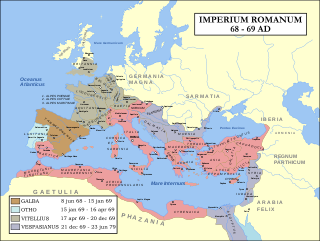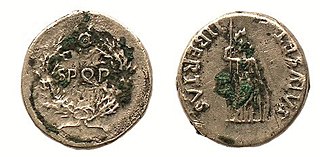Related Research Articles

Galba was Roman emperor, ruling for 7 months from 8 June AD 68 to 15 January 69. He was the first emperor in the Year of the Four Emperors and assumed the throne following Emperor Nero's suicide.

Otho was Roman emperor, ruling for three months from 15 January to 16 April 69. He was the second emperor of the Year of the Four Emperors.

Aulus Vitellius was Roman emperor for eight months, from 19 April to 20 December AD 69. Vitellius became emperor following the quick succession of the previous emperors Galba and Otho, in a year of civil war known as the Year of the Four Emperors. Vitellius added the honorific Germanicus to his name instead of Caesar upon his accession. Like his predecessor, Otho, Vitellius attempted to rally public support to his cause by honoring and imitating Nero who remained popular in the empire.

AD 69 (LXIX) was a common year starting on Sunday of the Julian calendar. In the Roman Empire, it was known as the Year of the consulship of Galba and Vinius. The denomination AD 69 for this year has been used since the early medieval period, when the Anno Domini calendar era became the prevalent method in Europe for naming years.

The 60s decade ran from January 1, AD 60, to December 31, AD 69.

Gaius Julius Vindex, was a Roman governor in the province of Gallia Lugdunensis. He was of a noble Gallic family of Aquitania and was one of the men belonging to a faction of Empress Agrippina, the mother of Nero. Vindex had taken part in a conspiracy against the emperor in 59.
Ofonius Tigellinus was a prefect of the Roman imperial bodyguard, known as the Praetorian Guard, from 62 until 68, during the reign of emperor Nero. Tigellinus gained imperial favour through his acquaintance with Nero's mother Agrippina the Younger, and was appointed prefect upon the death of his predecessor Sextus Afranius Burrus, a position Tigellinus held first with Faenius Rufus and then Nymphidius Sabinus.

The Praetorian Guard was the imperial guard of the Imperial Roman army that served various roles for the Roman emperor including being a bodyguard unit, counterintelligence, crowd control and gathering military intelligence.

The Year of the Four Emperors, AD 69, was the first civil war of the Roman Empire, during which four emperors ruled in succession: Galba, Otho, Vitellius, and Vespasian. It is considered an important interval, marking the transition from the Julio-Claudians, the first imperial dynasty, to the Flavian dynasty. The period witnessed several rebellions and claimants, with shifting allegiances and widespread turmoil in Rome and the provinces.

Histories is a Roman historical chronicle by Tacitus. Written c. 100–110, its complete form covered c. 69–96, a period which includes the Year of Four Emperors following the downfall of Nero, as well as the period between the rise of the Flavian dynasty under Vespasian and the death of Domitian. However, the surviving portion of the work only reaches the year 70 and the very beginning of the reign of Vespasian.
The Battle of Bedriacum refers to two battles fought during the Year of the Four Emperors near the village of Bedriacum, about 35 kilometers (22 mi) from the town of Cremona in northern Italy. The fighting in fact took place between Bedriacum and Cremona, and the battles are sometimes called "First Cremona" and "Second Cremona".
Titus Vinius was a Roman general and one of the most powerful men in Rome during the reign of the Emperor Galba.
Lucius Calpurnius Piso Frugi Licinianus (38–69) was a Roman nobleman who lived in the 1st century. His adoption by the Roman emperor Galba on 10 January 69 AD precipitated their joint murder by Otho, who had expected to be adopted instead. Otho then became the second emperor of the Year of the Four Emperors.
Sempronius Densus was a centurion in the Praetorian Guard in the 1st century. He was bodyguard to the emperor's heir, Piso Licinianus, and is remembered by history for his courage and loyalty in singlehandedly defending his charge from scores of armed assassins, while all his comrades deserted or switched sides.
Gaius Nymphidius Sabinus was a Prefect of the Praetorian Guard during the rule of Emperor Nero from AD 65 until his death in 68. He shared this office together with Ofonius Tigellinus, replacing his previous colleague Faenius Rufus. During the second half of the 60s, Nero grew increasingly unpopular with the people and the army, leading to a number of rebellions which ultimately caused his downfall and suicide in 68. Nymphidius took part in the final conspiracy against Nero and persuaded the Praetorian Guard to desert him, but when he attempted to have himself declared emperor, he was killed by his own soldiers.
Titus Flavius T. f. T. n. Sabinus was a Roman politician and soldier. A native of Reate, he was the elder son of Titus Flavius Sabinus and Vespasia Polla, and brother of the Emperor Vespasian.
Cornelius Fuscus was a Roman general who fought campaigns under the Emperors of the Flavian dynasty. He first distinguished himself as one of Vespasian's most ardent supporters during the civil war of 69 AD, known as the Year of the Four Emperors. Vespasian's son Domitian employed Fuscus as prefect of the Praetorian Guard, a post he held from 81 until his death.
Lucius Salvius Otho Titianus was the elder brother of the Roman Emperor Otho. As a Roman senator, he was consul in the year 52 as the colleague of Faustus Cornelius Sulla Felix, and appointed consul as his brother's colleague for the period from Galba's murder to the end of February. When Otho left Rome to halt the advance of Vitellius into Italy, he put the daily imperial responsibilities in the hands of Titianus. Subsequently, Titianus was appointed generalissimo in charge of the war by Otho and was present at the First Battle of Bedriacum.
Aulus Marius Celsus was a Roman senator who held several offices in the emperor's service during the first century AD, as well as playing a role in the Year of Four Emperors. He was suffect consul of the nundinium of July to August 69 as the colleague of Gnaeus Arrius Antoninus.
Icelus Martianus was a freedman of and adviser to the Roman Emperor Galba. Icelus had been imprisoned and released during the revolt against Nero and was present at Nero's suicide where he granted Nero's request that his body would be buried intact. When Icelus brought news of Nero's death to Galba, he showered him with kisses; Suetonius suggests that Icelus was a homosexual lover of Galba. Icelus was given the name Martianus and elevated to the rank of knight by Galba. This was contrary to the Tiberian law which stipulated that no freedman could be elevated to equestrian rank without first having three previous generations of free birth. Icelus rivalled Titus Vinius, and Cornelius Laco for influence over Galba who executed numerous Roman citizens without trial. Icelus along with Laco opposed the adoption of Otho by Galba. After Galba was deposed, Icelus was publicly executed by Otho who accused Icelus of theft of public funds.
References
- ↑ Cassius Dio 60, 23, 3.
- ↑ Arthur Murphy (1811). The works of Cornelius Tacitus: with an essay on his life and genius, notes, supplements, &c. Printed for J. Stockdale. pp. 292–.